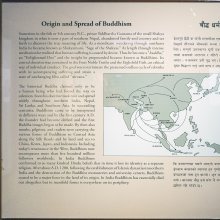Yati, Yāti, Yatī, Yatin: 40 definitions
Introduction:
Yati means something in Hinduism, Sanskrit, Jainism, Prakrit, Buddhism, Pali, the history of ancient India, Marathi, Hindi, biology, Tamil. If you want to know the exact meaning, history, etymology or English translation of this term then check out the descriptions on this page. Add your comment or reference to a book if you want to contribute to this summary article.
Yati has 36 English definitions available.
Images (photo gallery)
Languages of India and abroad
Sanskrit dictionary
[Deutsch Wörterbuch]
Source: Cologne Digital Sanskrit Dictionaries: Böhtlingk and Roth Grosses Petersburger WörterbuchYati (यति):—1. (von 1. ya) pron. rel. quot, wie viele [Vopadeva’s Grammatik 7, 94.] nom. und acc. flexionslos, yatibhis, yatibhyas, yatīnām, yatiṣu [3, 54.] [Pāṇini’s acht Bücher 1, 1, 23. 25. 4, 1, 10. 7, 1, 22. 55. 6, 1, 179. - 181.] tvaṃ vettha.yati.te [Ṛgveda 10, 15, 13.] a.u.ū.ve yatamānā.yati.ṣṭha [18, 6. 63, 6.] wie oft [Atharvavedasaṃhitā 10, 3, 6], wofern hier nicht vielmehr yadi zu lesen ist.
--- OR ---
Yati (यति):—2. (von yat) m.
1) Name eines mit den Bhṛgu zusammenhängenden alten Geschlechts; pl. [Ṛgveda 8, 3, 9. 6, 18.] [Weber’s Indische Studien 3, 465,] [Nalopākhyāna] [ŚVETĀŚV. Upakośā 5, 3.] Es scheint ihnen eine Thätigkeit bei der Bildung der Welt zugeschrieben zu werden: yaddevā.yatayo yathā.bhuvanā.yapinvata [Ṛgveda 10, 72, 7.] Die Brāhmaṇa haben eine Legende, nach der Indra die Yati dem Wilde zum Frass hinwirft, was als Frevel bezeichnet wird. [Aitareyabrāhmaṇa 7, 28.] [Taittirīyasaṃhitā 2, 4, 9, 2. 6, 2, 7, 5.] [Śāṅkhāyana’s Śrautasūtrāṇi 14, 50, 2.] [Kāṭhaka-Recension 8, 5. 11, 10. 25, 6. 36, 7.] [Pañcaviṃśabrāhmaṇa 8, 1, 4. 13, 4, 16.] [Kauṣītakyupaniṣad 3, 1.] Die Commentatoren sehen darin entweder wirkliche Asketen oder in solche verwandelte Asura. sg.: yatirna, bhṛgurna [Aśvalāyana’s Śrautasūtrāni 6, 3,] [?1; vgl. Atharvavedasaṃhitā 2, 5, 3.] ein Sohn Brahman's [Bhāgavatapurāṇa 4, 8, 1.] Nahuṣa’s [Mahābhārata 1, 3155.] [Harivaṃśa 1600. fgg.] [Viṣṇupurāṇa 413.] [Bhāgavatapurāṇa 9, 18, 1. 2. Viśvāmitra’s] [Mahābhārata 13, 257.] —
2) ein Asket, ein Mann, der der Welt entsagt hat (zur Festsetzung dieser Bedeutung mag ein mit yam angenommener Zusammenhang beigetragen haben) [Amarakoṣa 2, 7, 43.] [Trikāṇḍaśeṣa 3, 3, 178.] [Hemacandra’s Abhidhānacintāmaṇi 75. 809.] [Anekārthasaṃgraha 2, 188.] [Medinīkoṣa t. 47.] [Halāyudha 2, 189. 238. fg.] [UJJVAL.] zu [Uṇādisūtra 4, 117.] yatayaḥ kṣīṇadoṣāḥ [Muṇḍakopaniṣad 3, 1, 5.] [PRACETAS] bei [Colebrooke 1, 117.] gṛhastha, brahmacārin, vanastha, yati [Manu’s Gesetzbuch.5,137.6,54. fgg. 58. 69. 86. fg. 12,48.] [Bhagavadgītā.4,28.5,26.] [Rāmāyaṇa.1,5,21.] [Rāmāyaṇa Gorresio 2,16,45. 53,2.3,53,26.] [Weber’s Indische Studien.2,10. 172.9,121.] [Śākuntala 179.] [Raghuvaṃśa.8,16.] [Mālavikāgnimitra 13.] [Spr. 782. 2064. 4265.] [Varāhamihira’s Bṛhajjātaka S. 51,5.] [Bhāgavatapurāṇa.2,2,15.7,48.] [Oxforder Handschriften.8,a,39. 282,b,41.] [WEBER, Rāmatāpanīya Upaniṣad 362.] [Dhūrtasamāgama] in [Lassen’s Anthologie 76,12. 85,3.] [Pañcatantra 34,4.] mahā [Mārkāṇḍeyapurāṇa 41, 22.] yatīndra [Lassen’s Anthologie (II) 87, 19.] yatīndu [Oxforder Handschriften 210,b, No. 497.] ayati [Bhagavadgītā 6, 37. Yati] bei den Jaina [Colebrooke 2, 195.] [WILSON, Sel. Works 1, 317. fgg. 342. fg.] Beiname Śiva’s [Mahābhārata 14, 196.] yatipañcaka n. fünf über die Yati handelnde Strophen [Kāvya-Saṅgraha 487. fg.] —
3) = nikāra [Hemacandra’s Anekārthasaṃgraha] [Medinīkoṣa]
--- OR ---
Yati (यति):—
--- OR ---
Yāti (याति):—f. angeblich nom. act. vom intens. von 1. yā [Pāṇini’s acht Bücher 1, 1, 58,] [Scholiast] — Vgl. ahaṃ .
--- OR ---
Yati (यति):—2.
2) [Hemacandra] [Yogaśāstra 4, 8.] dharma [1, 45.] yatīndra ebend. —
4) etwa Ordner: ma.ī.ām [Ṛgveda 7, 13, 1.] Geber [Sāyaṇa]
Source: Cologne Digital Sanskrit Dictionaries: Böhtlingk and Roth Grosses Petersburger WörterbuchYatin (यतिन्):—
1) m. = yati ein Asket [Amarakoṣa 2, 7, 43.] [Hemacandra’s Abhidhānacintāmaṇi 76.] [PAÑCAR. 1, 10, 80.] —
2) yatinī f. Wittwe [Śabdaratnāvalī im Śabdakalpadruma]
Source: Cologne Digital Sanskrit Dictionaries: Sanskrit-Wörterbuch in kürzerer FassungYati (यति):—1. Adj. Pl. (Nom. Acc. yati quot , wie viele. [Atharvaveda 10,3,6] vielleicht fehlerhaft für yadi.
--- OR ---
Yati (यति):—2. m. —
1) etwa Ordner (Geber nach [Sāyaṇa. ] ) —
2) Pl. Nomen proprium eines mit den Bhṛgu zusammenhängenden Geschlechts. Auch Sg. neben bhṛgu. Gilt für einen Sohn Brahman’s , Nahuṣa’s oder Viśvāmitra's. —
3) ein Asket , ein Mann , der der Welt entsagt hat. —
4) * = nikāra oder kāra ([Śāśvata’s Anekārthasamuccaya] ).
--- OR ---
Yati (यति):—3. f. —
1) Festhaltung , Leitung. —
2) Pause (in der Musik) , Caesur (im Verse). —
3) *Wittwe ; auch * yatī.
--- OR ---
Yāti (याति):—in ahaṃyāti.
Source: Cologne Digital Sanskrit Dictionaries: Sanskrit-Wörterbuch in kürzerer FassungYatin (यतिन्):——
1) m. Asket. —
2) *f. nī Wittwe.
Sanskrit, also spelled संस्कृतम् (saṃskṛtam), is an ancient language of India commonly seen as the grandmother of the Indo-European language family (even English!). Closely allied with Prakrit and Pali, Sanskrit is more exhaustive in both grammar and terms and has the most extensive collection of literature in the world, greatly surpassing its sister-languages Greek and Latin.
See also (Relevant definitions)
Starts with (+86): Yatibhagavata, Yatibhamga, Yatibhrashta, Yatibhushani, Yaticandrayana, Yatichandrayana, Yatidha, Yatidharma, Yatidharman, Yatidharmaprabodhini, Yatidharmaprakasha, Yatidharmasamgraha, Yatidharmasamuccaya, Yatidharmasasuccaya, Yatidharmin, Yatidosha, Yatigrihin, Yatika, Yatikartavyagangastuti, Yatikawa.
Ends with (+1425): Abbhuyyati, Abhibhakkhayati, Abhibudhyati, Abhichadayati, Abhichhadayati, Abhidharayati, Abhidhyayati, Abhidyotayati, Abhijayati, Abhijjhayati, Abhiliyati, Abhimanyati, Abhimukhayati, Abhinamayati, Abhinirjayati, Abhinirnamayati, Abhinirupayati, Abhinishpeshayati, Abhinishpidayati, Abhiniveshyati.
Full-text (+2333): Yadi, Jai, Yatipatra, Ayati, Prithurashmi, Iyat, Yatini, Ayatin, Dushkara, Bhavayatibhu, Kiyat, Abhishoka, Amshayat, Yata, Yativalu, Unnidray, Samyati, Kridapay, Madhuy, Prekiy.
Relevant text
Search found 179 books and stories containing Yati, Yaathi, Yadhi, Yadi, Yathi, Yāti, Yatī, Yātī, Yatin; (plurals include: Yatis, Yaathis, Yadhis, Yadis, Yathis, Yātis, Yatīs, Yātīs, Yatins). You can also click to the full overview containing English textual excerpts. Below are direct links for the most relevant articles:
Historical Elements in the Matsya Purana (by Chaitali Kadia)
Muni and Yāti < [Chapter 5 - Cultural history in the Matsya-Purāṇa]
Lineages of Budha < [Chapter 6 - Human history in the Matsya-Purāṇa]
Puru dynasty < [Chapter 6 - Human history in the Matsya-Purāṇa]
Vakyapadiya of Bhartrihari (by K. A. Subramania Iyer)
Verse 3.14.511 < [Book 3 - Pada-kāṇḍa (14): Vṛtti-samuddeśa (On Ccomplex Formation)]
Verse 2.444 < [Book 2 - Vākya-kāṇḍa]
Verse 2.127cd < [Book 2 - Vākya-kāṇḍa]
Garga Samhita (English) (by Danavir Goswami)
Verse 4.1.22 < [Chapter 1 - The Story of the Personified Vedas]
Verses 4.1.43-44 < [Chapter 1 - The Story of the Personified Vedas]
Verse 1.8.21 < [Chapter 8 - Description of Śrī Rādhikā’s Birth]
The Markandeya Purana (Study) (by Chandamita Bhattacharya)
6. A Successful Yogin < [Chapter 4]
Position of Women (Introduction) < [Chapter 2]
Women as Satī < [Chapter 2]
Rig Veda (translation and commentary) (by H. H. Wilson)
Chaitanya Bhagavata (by Bhumipati Dāsa)
Verse 1.9.5 < [Chapter 9 - Nityānanda’s Childhood Pastimes and Travels to Holy Places]
Verse 2.5.145 < [Chapter 5 - Lord Nityānanda’s Vyāsa-pūjā Ceremony and His Darśana of the Lord’s Six-armed Form]
Verse 3.8.152 < [Chapter 8 - Mahāprabhu’s Water Sports in Narendra- sarovara]
Related products


